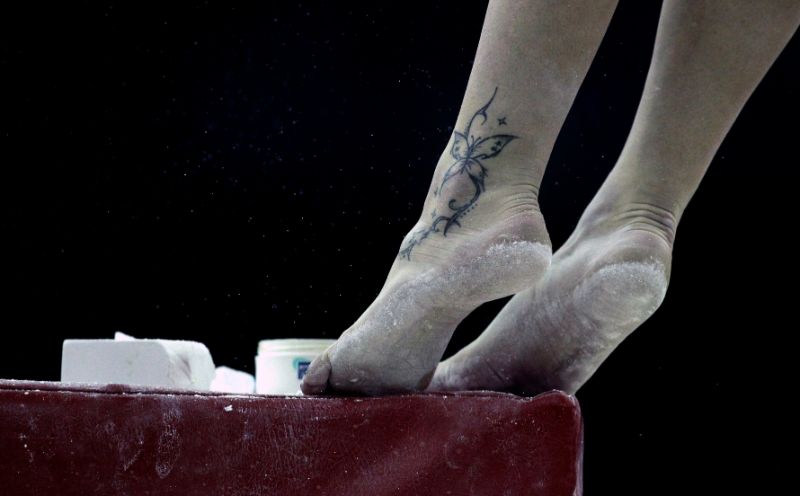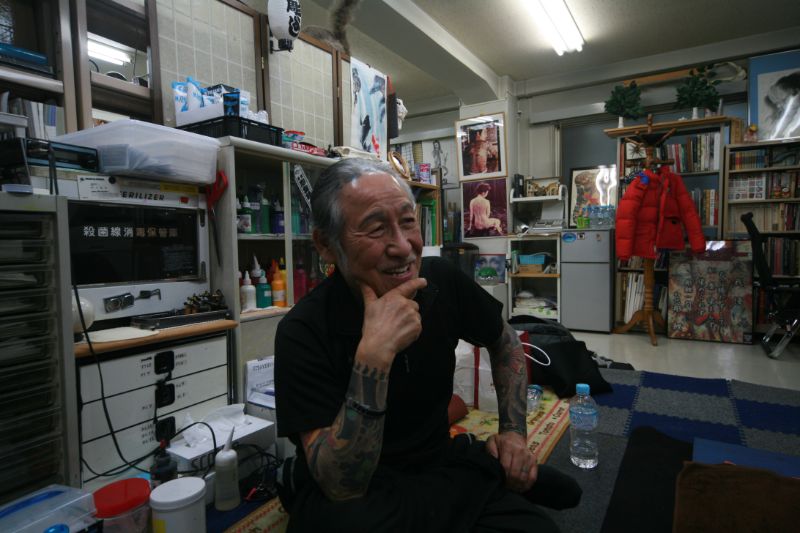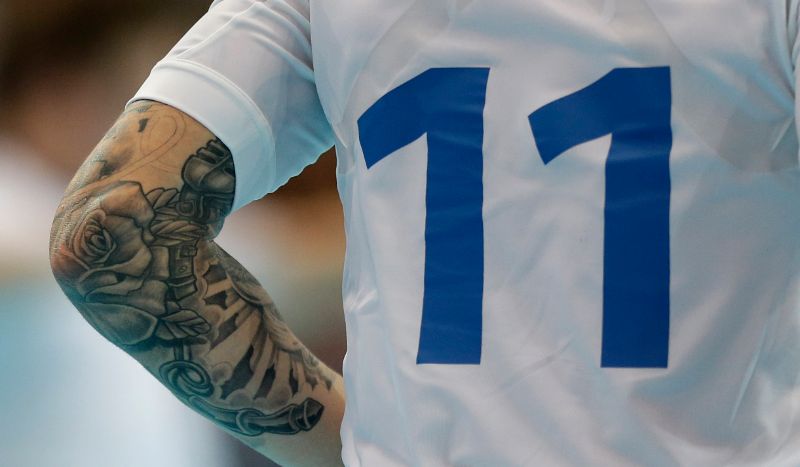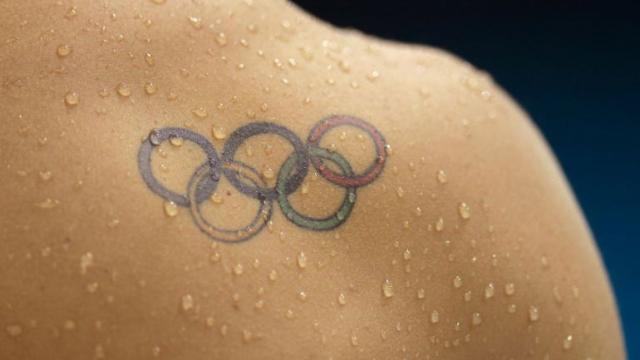The 2016 Rio Olympics are underway, and athletes from around the globe are competing for gold. Many of those Olympians are inked, as are those spectators who have flocked to the games. All are giving hope to those who want Japan, host of the next Summer Games, to become more open-minded about tattooing.
Image: Matt Slocum | AP
Numerous Olympic athletes get tattoos as a way to (literally) mark the event, and teams also get matching designs as a way to bond. For some, though, it’s more than that.

Image: Matt Dunham | AP
Tattoos can be like a talisman, explaining why athletes, who depend so much on their body, would want to get them: To enhance the way they look, for example, to function as good luck charms, or to even protect themselves.
Already at Rio (and in the build-up to it), we’ve seen a ton of athletes showing off Olympic tattoos, both new and old. The same goes for in years past.
Whilst on my run a kid rode by on his bike and said,
“I like your Audi rings tattoo!”
— Andrew Wheating (@AndrewWheating) July 31, 2016
Not long now, my first race is on Sunday!! Need all the support I can get ?✌️ #Swimming #Rio #Olympics #Tattoo #Ink pic.twitter.com/iaO1D1HZTk
— Chris Walker-Hebborn (@WalkerHebborn) August 4, 2016
.@mackbrown14‘s new archery-themed #Olympics tattoo is AWESOME. pic.twitter.com/sdQ303RxKH
— NBC Olympics (@NBCOlympics) August 2, 2016
Kevin Durant preps for Rio Olympics by getting a giant 2Pac tattoo https://t.co/21sbNWE1me via @YahooSports
— Yahoo (@Yahoo) July 23, 2016
Olympic fever is on ?? @AtriManu pic.twitter.com/0przaP3cbl
— Gutta Jwala (@Guttajwala) July 31, 2016
And its done 2016 #proud #twotimeolympian #Rio2016 #RioOlympics #amin #angeltatoo #Hyderabad pic.twitter.com/y07WjQdCLl
— Gutta Jwala (@Guttajwala) July 24, 2016
Editing away for Olympics coverage! @JeremyATaiwo is the coolest guy AND has a Gryffindor tattoo? Good luck in Rio! pic.twitter.com/HZeXUMji9p
— Haley Thayer (@HaleyThayer_) July 27, 2016
Even people who aren’t necessarily into tattoos can see that Olympics ones can be special.
I’m not a tattoo person but would get one if I made the Olympics: pic.twitter.com/87zn8wGVAG
— Rachel Bachman (@Bachscore) August 7, 2016
While nobody at the 2016 Olympics is batting much of an eye at the tattoos on display, the 2020 Olympics could prove trickier. There’s a good reason for that, and that reason is Japan.
As Kotaku previously reported, authorities in Japan are trying to make tattooing illegal by claiming that one must be a licensed medical practitioner to pierce the skin and insert ink. The law they point to was created at the turn of this century due to problems that arose over permanent make-up tattoos. Tattooers in Japan correctly said they come from an entirely different tradition. They devote their lives to learning, perfecting and personalising motifs and designs. This isn’t something anyone with a medical licence can do. What tattooers in Japan want is the respect their craft rightly deserves.
While writing Japanese Tattoos: History * Culture * Design, the country’s most famous tattooer Horiyoshi III spoke to me and my co-author (Osaka-based tattooer Hori Benny of Invasion Club) about how the Tokyo Olympics could help change the country’s attitude about tattooing. It was only a few months after Tokyo had successfully secured the 2020 games, yet tattooers were already seeing how the Olympics could change everything.

Horiyoshi III in his studio [Image: Brian Ashcraft]
This is discussed further in the book, but the short of it is that there are numerous, deeply ingrained reasons why many Japanese people are against tattooing. Some of them are because yakuza (Japanese gangsters) are often tattooed, while others see it as disrespectful to one’s parents. In Japan, there tends to be an inability to separate the skin that covers the body from the person who is inside. The reality is that all kinds of people have tattoos in modern Japan. Health care workers, musicians, office workers, fashionistas, artists, members of the PTA — you name it. They just tend to keep their tattoos hidden unless they are in areas where they feel safe and places they know they won’t make others uncomfortable.
Honestly 1 of the best tattoo tradition groups to be part of. #TattooDesign #tattoo #Olympics #Athletics #sports pic.twitter.com/MeOfzelIec
— fat_panda (@Archieschoice) February 14, 2015
During the Tokyo Olympics, it’s unlikely that athletes will be asked to cover up their tattoos when they compete. Right now, whenever inked foreign athletes appear on Japanese TV, they have their tattoos on display for all to see. However, Japanese competitors with tattoos (and yes, I can tell you they most certainly do exist) tend to keep their work covered. People might unfairly judge them or make all kinds of unnecessary and incorrect assumptions.
The problems that could arise are when athletes are not competing. Many of them (and tourists!) may want to visit a hot springs while in Japan. The rub is that many hot springs do not allow patrons with tattoos. Some don’t care (especially for foreigners), but enough do that this could cause a potential problem as values and ideas over tattoos clash.

[Image: Matthias Schrader | AP]
All this brings back memories of how a scholar from New Zealand named Erana Te Haeata Brewerton, who was speaking at an academic forum about Hokkaido’s indigenous Ainu people, wasn’t allowed into a hot springs because of her Maori facial tattoos.
“We realise tattoos come from many different backgrounds, but most of our customers don’t understand that,” the hot springs told Hokkaido Shimbun at the time (via WSJ). “If we make an exception, we’ll betray the trust we’ve built up over the years up to now.”
In short: We didn’t want to offend our uptight customers. Internationally, the incident came off as culturally insensitive to Brewerton, lumping her in with all sorts of unsavoury tattoo connotations Japan has. Domestically, it’s just how things are.
When the Tokyo Olympics get underway, it won’t only be tattooed athletes, but a huge increase in tourists, many of whom are also tattooed, that arrive for the games. Again, these visitors, eager to experience all that Japan has to offer, could run into trouble. That’s why some hot springs are starting to offer stickers to foreigners with tattoos so they can cover them up. But what if your whole back is done? Or most of your body? Does that mean you’ll need to cover yourself in dozens on stickers?
It all seems rather silly. Even sillier when you discover that many hot springs owners only want to allow foreigners to cover up their tattoos. Inked Japanese patrons will continue to be banned.
Check out this gymnast’s elaborate Olympics tattoo! https://t.co/l2S4YPCOtz pic.twitter.com/zvbUhX77ZE
— NBC Olympics (@NBCOlympics) October 27, 2015
The elephant in the room is that authorities in Osaka contest that tattooing is illegal, even though a law professor from the highly prestigious Kyoto University recently pointed out that no law can categorically regulate tattooing in Japan.
The Save Tattooing in Japan organisation is fighting these Japanese authorities, but if they are unsuccessful and legal precedent is then set, what does that mean for the tourists and athletes who hope to get tattoos while in Japan after they’re done competing? It would then mean they were breaking the law.
Every tattooer I’ve spoken to about this, and every time Hori Benny and I discuss it, there is a desire that by exposing more Japanese people to tattooing in a positive way, that it will change people’s perceptions for the better. Over the past few decades, tattooing’s image in Japan has slowly been softening and evolving. It still hasn’t normalised, though, and all sorts of baggage and aspersions continue to be thrust upon those with tattoos.
Tokyo 2020 will bring competitors, fans and money into the country. But we’ll have to see if it brings changed attitudes. Here’s hoping it does.

Comments
9 responses to “The 2020 Olympics Could Change Tattooing In Japan Forever”
How pleasantly surprising. I was a little worried at first after the byline and long list of twitter links but this was a thoughtful, informative and current article. I vaguely knew about the tattoo policies in Japan but I had never thought about it in the context of a huge international event. More like this please Brian.
I’d expect something similar to what happened in china with the pollution problem. A blanket bandaid for the duration of the event.
A really interesting and insightful article.
I have a feeling that hoping a few weeks of Olympics will reverse a country’s policy/views on tattoos is optimistic, but even a small step towards reducing the stigma is a worthwhile one.
A great read indeed. You’re right that a few weeks of Olympics in another country aren’t going to do much, but I wouldn’t be surprised if the Olympics in Tokyo change the Countries cultural views on this topic somewhat.
Presumably Japan already gets thousands of tattooed tourists (tattourists?) every year. Why would it be an issue during the Olympics if it isn’t already an issue now?
Because it’s thousands of tattooed tourists in a couple of weeks 😛
It is an issue though. People with visible tattoos are treated differently (even worse than foreigners in general) and denied entry some places (bathhouses, where you’re naked, is the one obvious example pointed out in the article).
If that’s the culture of the host country, so be it. Why should an Olympic tourist be entitled to an exemption from the rules that a non-Olympic tourist must abide by? It should be up to the host country to decide how important the tourist dollar is to their economy.
People are going to find much more oppressive restrictions when Qatar hosts the World Cup.
No one is arguing that Japan is obliged to change their mindset or that Olympic tourists are entitled to any exemptions by private businesses. However as host country, they are obliged to be accommodating in general, that’s what being a host country means.
The article was querying if this will hasten the cultural trend towards being less conservative in views on tattoos because of the fact they will have openly tattooed athletes thrust upon them and flooding their TV screens, and a greater density of tourists who may or may not have tattoos as well.
On a practical level, the no tattoo rule is basically a way to say “no yakuza are welcome here” without actually saying it.
It’s weird, outdated, and inconsistently applied, but that’s the practical reason for it.
Am I the only one who though about a joke situation out of this?
Like some tourist visiting Japan during the 2020 Olympics who decided to get himself a tattoo at some “old master” tattooist shop. He went inside and request a tattoo that means “manhood” or “virility” on his neck or belly as he’s thinking of himself as though… and the tattooist hardly understand it… then speak to his grandson which translate the request… then the tattooist ink this : 陰茎 (pronounce as ìńkéé which means “penis”)
Then the guy start walking in the street proud of his new tattoo while people laugh with him (and at him) as nobody dare to give him an explanation of what it actually means. ;D